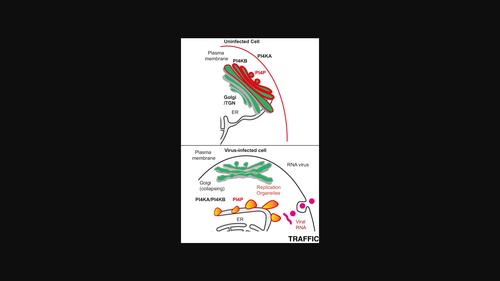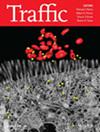Molecular mechanisms of PI4K regulation and their involvement in viral replication.
IF 2.5
3区 生物学
Q3 CELL BIOLOGY
引用次数: 11
Abstract
Lipid phosphoinositides are master signaling molecules in eukaryotic cells and key markers of organelle identity. Because of these important roles, the kinases and phosphatases that generate phosphoinositides must be tightly regulated. Viruses can manipulate this regulation, with the Type III phosphatidylinositol 4‐kinases (PI4KA and PI4KB) being hijacked by many RNA viruses to mediate their intracellular replication through the formation of phosphatidylinositol 4‐phosphate (PI4P)‐enriched replication organelles (ROs). Different viruses have evolved unique approaches toward activating PI4K enzymes to form ROs, through both direct binding of PI4Ks and modulation of PI4K accessory proteins. This review will focus on PI4KA and PI4KB and discuss their roles in signaling, functions in membrane trafficking and manipulation by viruses. Our focus will be the molecular basis for how PI4KA and PI4KB are activated by both protein‐binding partners and post‐translational modifications, with an emphasis on understanding the different molecular mechanisms viruses have evolved to usurp PI4Ks. We will also discuss the chemical tools available to study the role of PI4Ks in viral infection.

PI4K调控的分子机制及其在病毒复制中的作用。
脂质磷酸肌苷是真核细胞的主要信号分子,也是细胞器身份的关键标志。由于这些重要的作用,产生磷酸肌苷的激酶和磷酸酶必须受到严格的调节。病毒可以操纵这种调节,III型磷脂酰肌醇4-激酶(PI4KA和PI4KB)被许多RNA病毒劫持,通过形成富含磷脂酰肌醇4-磷酸(PI4P)的复制细胞器(ROs)来介导它们的细胞内复制。不同的病毒已经进化出独特的方法来激活PI4K酶形成ROs,通过直接结合PI4K和调节PI4K辅助蛋白。本文将重点介绍PI4KA和PI4KB,并讨论它们在信号转导、膜转运和病毒操纵中的作用。我们的重点将是PI4KA和PI4KB如何被蛋白结合伙伴和翻译后修饰激活的分子基础,重点是了解病毒进化到篡位PI4Ks的不同分子机制。我们还将讨论可用于研究PI4Ks在病毒感染中的作用的化学工具。
本文章由计算机程序翻译,如有差异,请以英文原文为准。
求助全文
约1分钟内获得全文
求助全文
来源期刊

Traffic
生物-细胞生物学
CiteScore
8.10
自引率
2.20%
发文量
50
审稿时长
2 months
期刊介绍:
Traffic encourages and facilitates the publication of papers in any field relating to intracellular transport in health and disease. Traffic papers span disciplines such as developmental biology, neuroscience, innate and adaptive immunity, epithelial cell biology, intracellular pathogens and host-pathogen interactions, among others using any eukaryotic model system. Areas of particular interest include protein, nucleic acid and lipid traffic, molecular motors, intracellular pathogens, intracellular proteolysis, nuclear import and export, cytokinesis and the cell cycle, the interface between signaling and trafficking or localization, protein translocation, the cell biology of adaptive an innate immunity, organelle biogenesis, metabolism, cell polarity and organization, and organelle movement.
All aspects of the structural, molecular biology, biochemistry, genetics, morphology, intracellular signaling and relationship to hereditary or infectious diseases will be covered. Manuscripts must provide a clear conceptual or mechanistic advance. The editors will reject papers that require major changes, including addition of significant experimental data or other significant revision.
Traffic will consider manuscripts of any length, but encourages authors to limit their papers to 16 typeset pages or less.
 求助内容:
求助内容: 应助结果提醒方式:
应助结果提醒方式:


